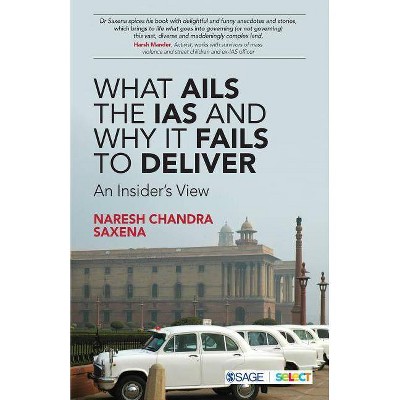What Ails the IAS and Why It Fails to Deliver - by Naresh Chandra Saxena (Paperback)

Similar Products
Products of same category from the store
AllProduct info
<p/><br></br><p><b> Book Synopsis </b></p></br></br>An unorthodox and maverick administrator, the author worked in top policy positions, but the system rejected the reforms that he advocated. In his career he followed the economic philosophy of 'socialism for the poor and free market for the rich'. However, the political and administrative system in India seemed to believe in 'indifference to the poor and control over the rich to facilitate rent seeking'. <br/> <br/> The book is full of anecdotes ranging from how the author resisted political corruption that led to the Prime Minister's annoyance to a situation when the author himself 'bribed' the Chief Minister to scrap oppressive laws against tribal women. As Joint Secretary, Minorities Commission, the author exposed the communal bias of the district administration in handling riots in Meerut; he was punished for bringing to light the killing of innocent Muslim women and children by the police. When Bihar became a 'failed state' during the Lalu Prasad Yadav era of 1990-2005, the author did not hesitate in rebuking the Chief Secretary who was his senior in service, and accused IAS officials in Bihar of behaving like English-speaking politicians. <br/> Despite their high integrity, hard work and competence, IAS officials do not exercise sufficient control over the field staff who collude with the junior staff in reporting false figures on hunger deaths, malnutrition and usage of toilets, leading to erosion of accountability. Not only do many welfare programmes such as NREGA, ICDS and PDS have design flaws, governance in India at the state and district levels is also quite weak, manifesting itself in poor service delivery, uncaring administration, corruption, and uncoordinated and wasteful public expenditure.<br/> <br/> Analysing the present Indian situation, the book suggests policy changes in all cross-cutting systemic issues such as the role of politicians, tenure, size and nature of Indian bureaucracy, accountability, monitoring of programmes and civil service reforms, which will transform individual competencies of IAS officers into better collective outcomes.</p> <br/><p/><br></br><p><b> Review Quotes </b></p></br></br><br><p>A brutally frank and brilliant assessment by a very experienced civil servant of the failure of the IAS to deliver efficiently key services of health, forest rights, education and tribal rights and removal of hunger of the common man. Full of very interesting anecdotes on interface with politicians, self-introspection and suggestion on reforming the governance system. Emphasizes the need for administrative reforms including stable tenures, accountability, effective monitoring and information system and capacity building. A very compelling call for systemic change.</p>--B. K. Chaturvedi, "Former Cabinet Secretary, Government of India"<br><br><p>A truly unusual and provocative book, written with candour, commitment and clarity. N. C. Saxena's superb account of the IAS places civil service reform in the context of a sharp and informed view of India's larger politics and society and the need for greater individual and collective initiatives together with strong political and administrative will to implement systemic reforms. This impressive work will appeal to those with an interest in making the state more outcome oriented and accountable to the people.</p>--Zoya Hasan, "Professor Emerita, Jawaharlal Nehru University"<br><br><p>All over the world, relentless commodification has cynicized the behaviour of states. Even though India is no exception to that, before asking What can be done, it is worth asking What is Indian about this process? because the formulaic answer is so often even less state. Dr Saxena, an IAS, gives us a book full of closely observed insights from his own working life and those of others about both inspiring successes and failures of system maintenance against the politicization of elite administrative culture, the penetration of private venality, and of caste, regional, religious and patriarchal identities into what he estimates is the wetter half of India's bureaucratic system. Even in the drier half, however, the result is poor development outcomes. He builds up to administrative reforms which include stability of tenure, domain expertise, pruning redundant positions, mid-career secondment for fresh experiences, lateral entry, shake-ups for accountability and M&E, especially of absenteeism. But they all need collective political backing. If you disagree, the ball is now in your court to mount an even better argument.</p>--Barbara Harriss-White, "Emeritus Professor of Development Studies, Oxford University"<br><br><p>N.C. Saxena's book presents a remarkable insight into the working of public administration in our country and the role of its most important player: the IAS... a must read for those who want to understand how the country's public administration functions and a call to policymakers to bring much needed reform in Indian polity. </p>--Indian Journal of Public Administration, Vol. 66 Issue 3<br><br>Dr Saxena is an immensely gifted and accomplished authority on the Indian Administrative Service. Here he draws on his unparalleled breadth of experience--in the ministries of rural development, environment and forests, and revenue; as Director of the Lal Bahadur Shastri National Academy of Administration; and on the Minorities Commission and the National Advisory Council. The result is a perceptive, compelling and deeply humane critique of the Service and its place in India's recent history. <br/>--James Manor, "School of Advanced Study, University of London"<br><br>Hailed by some as India's steel frame and reviled by others as a relic of the colonial past, the Indian Administrative Service is an enigma for most. In this candid insider account, Naresh Saxena gives the IAS a human face and shares valuable ideas for administrative reform.' --Jean Dréze, "Honorary Professor, Delhi School of Economics"<br><br>Our planners would be well advised to make compulsory reading, for all concerned, Naresh Chandra Saxena's candid, thoughtful and balanced book, What Ails the IAS and Why it Fails to Deliver, which offers much insight... Saxena has sensible suggestions for improving the standard of governance.' </p> <br/>--Indian Express, 24 November 2019<br><br>Saxena doesn't shy away from examining the politicization of the bureaucracy... His ideas for reform are well-thought-through and many, but conclusion is that all of it will need collective political will.</p>--Mint, 13 November 2019<br>
Price History
Price Archive shows prices from various stores, lets you see history and find the cheapest. There is no actual sale on the website. For all support, inquiry and suggestion messagescommunication@pricearchive.us


















